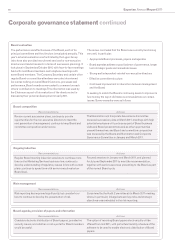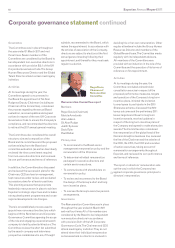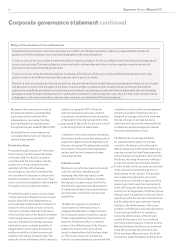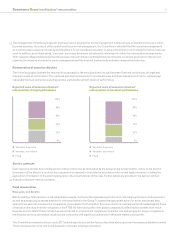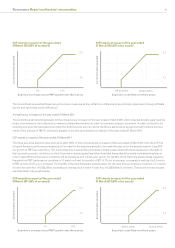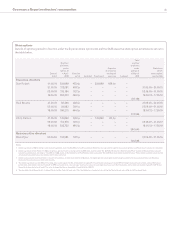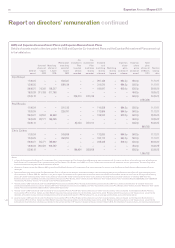Experian 2011 Annual Report Download - page 78
Download and view the complete annual report
Please find page 78 of the 2011 Experian annual report below. You can navigate through the pages in the report by either clicking on the pages listed below, or by using the keyword search tool below to find specific information within the annual report.
76 Experian Annual Report 2011
Report on directors’ remuneration continued
Explanation of remuneration
Introduction
The report has been drawn up in line with the UK Corporate Governance Code, Schedule 8 of the Large and Medium-sized Companies and
Groups (Accounts and Reports) Regulations 2008 and the UK Financial Services Authority Listing Rules.
The Remuneration Committee: members, role and frequency of meetings
Details of the Committee members, the scope of their role and frequency of meetings can be found in the corporate governance statement.
Working with advisers
In making its decisions, the Committee consults with the Chairman, the Chief Executive Officer, the Group HR Director, the Global Reward
Director and the Head of Executive Compensation who are invited to attend meetings of the Committee as appropriate. The Chief Financial
Officer is also consulted in respect of performance conditions applying to short and long-term incentive arrangements. No executives are
present when their own remuneration arrangements are being discussed.
The Committee has access to independent consultants to ensure that it receives objective advice. In 2007, Deloitte LLP (‘Deloitte’) were
appointed by the Committee as independent advisers and they continued to act during the year ended 31 March 2011. Deloitte also provided
unrelated advisory and tax services to the Group during the year. Kepler Associates (‘Kepler’) were also appointed by the Committee in 2007
and, during the year under review, provided advice and valuation data for Experian’s executive remuneration arrangements and also provided
advice on target calibration for the short and long-term incentive plans. Kepler do not provide any other services to the Group. Linklaters LLP
provided legal advice in respect of incentive plan design and interpretation.
Remuneration philosophy and principles
Experian’s remuneration philosophy is that reward should be used to drive long-term, sustainable business performance. In this regard, the
Committee aims to have in place remuneration principles for Experian which are consistent with its business objectives and are designed to:
•drive accountability and transparency and align remuneration with the interests of shareholders;
•provide a balanced portfolio of incentives which align both short-term (one-year) and longer-term (three-year) performance such that
sustainable growth and value are delivered for our shareholders;
•apply demanding performance conditions to deliver sustained profitable growth across the Group, thereby aligning incentives with
shareholders’ interests, setting these conditions with due regard to actual and expected market conditions;
•pay market-competitive base salaries;
•provide competitive performance-related compensation which influences performance and helps attract and retain executives by
providing the opportunity to earn commensurate rewards for the achievement of outstanding performance, which leads to long-term
shareholder value creation; and
•deliver competitive benefits to underpin the other components of the remuneration package.
Consistent with these principles, the Committee compares the Experian remuneration arrangements with those of other relevant
organisations and companies of similar size and scope to Experian. The remuneration arrangements are also reviewed in light of changing
market conditions, which have continued to be challenging over the year under review. Performance-related incentives are targeted at
upper quartile levels for the achievement of stretching objectives. Experian is committed to performance-related pay at all levels within the
organisation and the Committee takes into consideration the remuneration arrangements throughout Experian when determining those for
the executive directors.
The performance measures used in Experian’s incentive plans are all financial, with growth in profit being the key measure used. This
measure was selected as it reflects one of Experian’s key strategic objectives (driving profitable growth). The performance management
process, which is used throughout Experian, assesses executives against both financial and non-financial performance objectives.
Performance against these individual objectives ultimately supports growth in profit and so the Committee believes it is appropriate that
this remains the key measure for the Group’s incentive plans. For the long-term incentive plans, external consultants are used to calculate
whether, and the extent to which, the performance conditions have been met.
68
10


